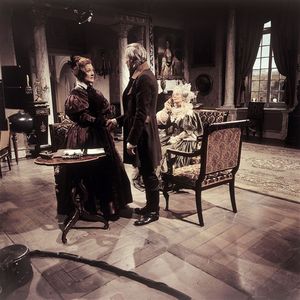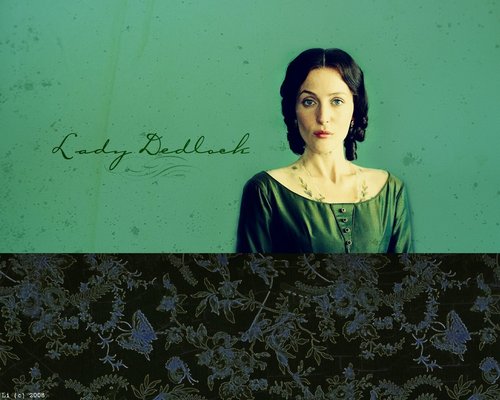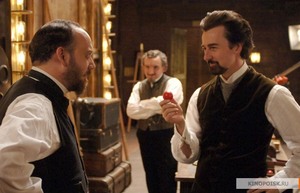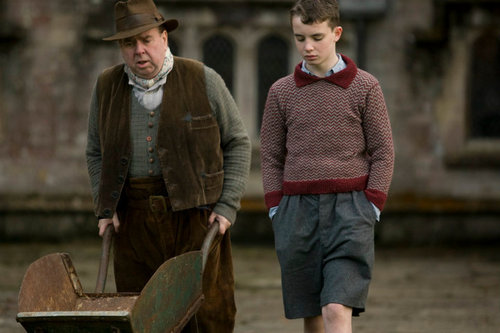"SENSE AND SENSIBILITY" (1971) Review
For some reason, I still find it hard to believe that until recently, very few people were aware that the first adaptation of Jane Austen's 1811 novel, "Sense and Sensibility", dated as far back as 1971. After all, people have been aware of other Austen adaptations during this same period or earlier. Even the Wikipedia site fails to mention it, except in connection with one of the cast members. What was about this four-part miniseries that eluded so many Austen fans?
In "SENSE AND SENSIBILITY", a wealthy landowner named Mr. Dashwood dies, leaving his two daughters and second wife at the mercy of his son by his first marriage, thanks to the rules of inheritance. When the son fails to financially help his sisters and stepmother, the trio are forced to live at a meager cottage, thanks to the generosity of Mrs. Dashwood's cousin. The miniseries follows the love lives of the sisters, while they deal with their new penniless status.
I could have went into greater detail about Elinor and Marianne Dashwood. But what would have been the point? Austen's novel and the other adaptations have made both their story and characters well known to fans. Everyone knows that the Dashwood sisters' penniless state have made them undesirable as potential mates among the English upper-class. And many know that Elinor Dashwood is the older and more sensible sister, who kept her emotions suppressed behind a facade of stoic behavior. They also know that Marianne is the younger sisters, whose romantic enthusiasm led to emotional excesses and irrational behavior. Was there something unique about this adaptation of Austen's novel? Hmmm. Other than it was probably the first version of the 1811 novel and the first of four versions to exclude the character of the youngest Dashwood sister, Margaret.
Overall, I believe that "SENSE AND SENSIBILITY" turned out to be an entertaining and well-paced television miniseries. But it was not perfect. One, I felt that screenwriter Denis Constanduros made a few missteps in his adaptation. I wish that Constanduros had included a scene featuring John Dashwood's last conversation with his dying father. I felt that his eventually betrayal of his promise, due to his wife's capriciousness would have possessed more bite. I also felt that Constanduros could have included more scenes featuring Marianne and John Willoughy's courtship. The period between their first meeting and Willoughby's decision to end their romance seemed to go by in a flash. It happened too soon for me to understand Marianne's grief over his rejection of her. Although there were a good deal of exterior shots of the English countryside, I wish there had been more exterior shots of early 19th century London, during the sisters' trip. The London sequences made the miniseries feel more like a filmed play. And why on earth did Constanduros allowed Elinor to pay a visit to Edward Ferrars' London rooms alone? What was he thinking? He should have allowed Elinor to summon Edward to Mrs. Jennings' home in order to deliver Colonel Brandon's news about a new job. I have one last major problem. Why on earth did costume designer had Elinor and Marianne wearing identical traveling outfits? They were not twin sisters. And no siblings from an upper-class family - especially of the female gender - would be caught dead in the outfits featured in the photograph at the end of this article. What was costumer designer Charles Knode thinking?
I also had some problems with the casting and performances. I had a real problem with actress Ciaran Madden's performance as Marianne Dashwood. How can I put it? It was over-the-top. I realize that she was at least 25 years old at the time this production was filmed. But did she and director David Giles really thought an exaggerated performance was necessary to portray the emotional 17 year-old Marianne? Was that their idea of portraying an emotional adolescent? And why would actor Michael Alderidge use a strong, regional accent for his portrayal of Sir John Middleton? I realize that his mother-in-law and wife came from a middle-class background. But Sir John and his cousin Mrs. Dashwood, did not. Both actresses who portrayed the Steele sisters - Frances Cuka and Maggie Jones - seemed at least a decade-and-a-half too old for their roles. And Kay Gallie's Fanny Dashwood seemed like such a major disappointment. Her Fanny struck me as too passive-aggressive and nervous in compare to the other actresses who portrayed the role.
But despite some disappointments, I must admit that "SENSE AND SENSIBILITY" turned out to be a pretty good production. Hell, I like it a lot more than I do the 1981 television version. Thanks to Constanduros's script and Giles' direction, the four-part miniseries struck me as well paced - aside from Marianne and Willoughby's courtship. Aside from the traveling outfits, I must admit that I found Knode's costume designs both colorful and elegant. And like the 1995 movie, I was happy to see that the screenplay allowed Marianne to become aware of Colonel Brandon before her meeting with Willoughby . . . allowing the pair's eventual romance in the last episode very credible.
There were also some very good performances in "SENSE AND SENSIBILITY". I found myself surprisingly impressed by Richard Owens' performance as Colonel Brandon. At first, I barely paid attention to him. But I must admit that his performance actually grew on me and I thought he did a credible job of slowly revealing Brandon's passion for Marianne. Despite his strong regional accent, I must admit that Michael Aldridge was perfectly cast as Mrs. Dashwood's gregarious cousin, Sir John Middleton. And despite her age, Frances Cuka did a very good of conveying Lucy Steele's manipulations regarding Edward, Elinor and the Ferrars family . . . even if I found it a bit obvious. I was very impressed by Milton Johns' performance as Elinor and Marianne's spineless older half-brother John Dashwood. In fact, I feel that he gave one of the better performances in the miniseries. Robin Ellis gave a solid performance as Edward Ferrars. However, I must admit that I was not that impressed by his screen chemistry with Joanna David's Elinor. In an ARTICLE I had written about Jane Austen's rogues, I stated that I found Clive Francis' portrayal of the caddish John Willoughby unmemorable. I take it back. On a second viewing, I found myself surprisingly impressed by his performance. I think I may have been distracted by the so-called Regency wig he was wearing . . . or the speed of the Marianne-Willoughby courtship. But I thought he gave a very complex performance.
But there were two performances in "SENSE AND SENSIBILITY" that I found outstanding. One of them belonged to Joanna David, who was perfect - well . . . almost - as Elinor Dashwood. She was one of the few performers who managed to restrain from "playing to the second balcony" as many other stage-trained actors tend to do. Mind you, there were moments when she seemed incapable of projecting Elinor's passionate nature behind the sensible facade. But more than any other person in the cast, she did a superb job in carrying the miniseries on her shoulders. The other outstanding performance turned out to be Patricia Rutledge's portrayal of the vivacious Mrs. Jennings, Sir John's mother-in-law. She was in her early 40s at the time and technically, too young for the role. But I cannot deny that Rutledge seemed like the very personification of the verbose and interfering, yet warm-hearted widow. Of the four Mrs. Jennings I have seen, only Elizabeth Spriggs from the 1995 movie seemed her equal.
"SENSE AND SENSIBILITY" is not the best adaptation of Jane Austen's 1811 novel, despite being the first. And it possessed certain aspects in both the script and casting that I found questionable. But thanks to David Giles' direction, Denis Constanduros' screenplay, and superb performances especially from Joanna David and Patricia Rutledge; I feel that it turned out to be a pretty damn good adaptation in the end. I would highly recommend it.
For some reason, I still find it hard to believe that until recently, very few people were aware that the first adaptation of Jane Austen's 1811 novel, "Sense and Sensibility", dated as far back as 1971. After all, people have been aware of other Austen adaptations during this same period or earlier. Even the Wikipedia site fails to mention it, except in connection with one of the cast members. What was about this four-part miniseries that eluded so many Austen fans?
In "SENSE AND SENSIBILITY", a wealthy landowner named Mr. Dashwood dies, leaving his two daughters and second wife at the mercy of his son by his first marriage, thanks to the rules of inheritance. When the son fails to financially help his sisters and stepmother, the trio are forced to live at a meager cottage, thanks to the generosity of Mrs. Dashwood's cousin. The miniseries follows the love lives of the sisters, while they deal with their new penniless status.
I could have went into greater detail about Elinor and Marianne Dashwood. But what would have been the point? Austen's novel and the other adaptations have made both their story and characters well known to fans. Everyone knows that the Dashwood sisters' penniless state have made them undesirable as potential mates among the English upper-class. And many know that Elinor Dashwood is the older and more sensible sister, who kept her emotions suppressed behind a facade of stoic behavior. They also know that Marianne is the younger sisters, whose romantic enthusiasm led to emotional excesses and irrational behavior. Was there something unique about this adaptation of Austen's novel? Hmmm. Other than it was probably the first version of the 1811 novel and the first of four versions to exclude the character of the youngest Dashwood sister, Margaret.
Overall, I believe that "SENSE AND SENSIBILITY" turned out to be an entertaining and well-paced television miniseries. But it was not perfect. One, I felt that screenwriter Denis Constanduros made a few missteps in his adaptation. I wish that Constanduros had included a scene featuring John Dashwood's last conversation with his dying father. I felt that his eventually betrayal of his promise, due to his wife's capriciousness would have possessed more bite. I also felt that Constanduros could have included more scenes featuring Marianne and John Willoughy's courtship. The period between their first meeting and Willoughby's decision to end their romance seemed to go by in a flash. It happened too soon for me to understand Marianne's grief over his rejection of her. Although there were a good deal of exterior shots of the English countryside, I wish there had been more exterior shots of early 19th century London, during the sisters' trip. The London sequences made the miniseries feel more like a filmed play. And why on earth did Constanduros allowed Elinor to pay a visit to Edward Ferrars' London rooms alone? What was he thinking? He should have allowed Elinor to summon Edward to Mrs. Jennings' home in order to deliver Colonel Brandon's news about a new job. I have one last major problem. Why on earth did costume designer had Elinor and Marianne wearing identical traveling outfits? They were not twin sisters. And no siblings from an upper-class family - especially of the female gender - would be caught dead in the outfits featured in the photograph at the end of this article. What was costumer designer Charles Knode thinking?
I also had some problems with the casting and performances. I had a real problem with actress Ciaran Madden's performance as Marianne Dashwood. How can I put it? It was over-the-top. I realize that she was at least 25 years old at the time this production was filmed. But did she and director David Giles really thought an exaggerated performance was necessary to portray the emotional 17 year-old Marianne? Was that their idea of portraying an emotional adolescent? And why would actor Michael Alderidge use a strong, regional accent for his portrayal of Sir John Middleton? I realize that his mother-in-law and wife came from a middle-class background. But Sir John and his cousin Mrs. Dashwood, did not. Both actresses who portrayed the Steele sisters - Frances Cuka and Maggie Jones - seemed at least a decade-and-a-half too old for their roles. And Kay Gallie's Fanny Dashwood seemed like such a major disappointment. Her Fanny struck me as too passive-aggressive and nervous in compare to the other actresses who portrayed the role.
But despite some disappointments, I must admit that "SENSE AND SENSIBILITY" turned out to be a pretty good production. Hell, I like it a lot more than I do the 1981 television version. Thanks to Constanduros's script and Giles' direction, the four-part miniseries struck me as well paced - aside from Marianne and Willoughby's courtship. Aside from the traveling outfits, I must admit that I found Knode's costume designs both colorful and elegant. And like the 1995 movie, I was happy to see that the screenplay allowed Marianne to become aware of Colonel Brandon before her meeting with Willoughby . . . allowing the pair's eventual romance in the last episode very credible.
There were also some very good performances in "SENSE AND SENSIBILITY". I found myself surprisingly impressed by Richard Owens' performance as Colonel Brandon. At first, I barely paid attention to him. But I must admit that his performance actually grew on me and I thought he did a credible job of slowly revealing Brandon's passion for Marianne. Despite his strong regional accent, I must admit that Michael Aldridge was perfectly cast as Mrs. Dashwood's gregarious cousin, Sir John Middleton. And despite her age, Frances Cuka did a very good of conveying Lucy Steele's manipulations regarding Edward, Elinor and the Ferrars family . . . even if I found it a bit obvious. I was very impressed by Milton Johns' performance as Elinor and Marianne's spineless older half-brother John Dashwood. In fact, I feel that he gave one of the better performances in the miniseries. Robin Ellis gave a solid performance as Edward Ferrars. However, I must admit that I was not that impressed by his screen chemistry with Joanna David's Elinor. In an ARTICLE I had written about Jane Austen's rogues, I stated that I found Clive Francis' portrayal of the caddish John Willoughby unmemorable. I take it back. On a second viewing, I found myself surprisingly impressed by his performance. I think I may have been distracted by the so-called Regency wig he was wearing . . . or the speed of the Marianne-Willoughby courtship. But I thought he gave a very complex performance.
But there were two performances in "SENSE AND SENSIBILITY" that I found outstanding. One of them belonged to Joanna David, who was perfect - well . . . almost - as Elinor Dashwood. She was one of the few performers who managed to restrain from "playing to the second balcony" as many other stage-trained actors tend to do. Mind you, there were moments when she seemed incapable of projecting Elinor's passionate nature behind the sensible facade. But more than any other person in the cast, she did a superb job in carrying the miniseries on her shoulders. The other outstanding performance turned out to be Patricia Rutledge's portrayal of the vivacious Mrs. Jennings, Sir John's mother-in-law. She was in her early 40s at the time and technically, too young for the role. But I cannot deny that Rutledge seemed like the very personification of the verbose and interfering, yet warm-hearted widow. Of the four Mrs. Jennings I have seen, only Elizabeth Spriggs from the 1995 movie seemed her equal.
"SENSE AND SENSIBILITY" is not the best adaptation of Jane Austen's 1811 novel, despite being the first. And it possessed certain aspects in both the script and casting that I found questionable. But thanks to David Giles' direction, Denis Constanduros' screenplay, and superb performances especially from Joanna David and Patricia Rutledge; I feel that it turned out to be a pretty damn good adaptation in the end. I would highly recommend it.

The poster to this film.

Since the release of the 1975 miniseries "NORTH AND SOUTH" in 2013, I have found myself wondering about other BBC productions from the 1960s and 1970s.
I recently discovered that the 1996 miniseries, "THE TENANT OF WILDFELL HALL" was the second adaptation of Anne Brontë's novel. The first was a 1968 miniseries that starred Janet Munro, Bryan Marshall and Corin Redgrave. I also discovered that the 1999 miniseries, "WIVES AND DAUGHTERS", was not the first adaptation of Elizabeth Gaskell's novel. The BBC aired an earlier adaptation in 1971 that starred Zhivila Roche.
Does anyone know how to contact the BBC? I would like them to consider releasing these two productions in the near future.
I have just watched the very first episode of The Onedin Line, a 1971 BBC production and although I am perfectly ready to admit that I am long overdue, I cannot help but feeling a new obsession coming up.
Plot: James Onedin is a poor young skipper in Liverpool who dreams of starting his own shipping business and breaking free from his powerful boss. In order to acquire his first ship, Charlotte Rhodes, he marries Anne the daughter of the ship owner and the adventure begins…
link
Plot: James Onedin is a poor young skipper in Liverpool who dreams of starting his own shipping business and breaking free from his powerful boss. In order to acquire his first ship, Charlotte Rhodes, he marries Anne the daughter of the ship owner and the adventure begins…
link




















